| Srl | Item |
| 1 |
ID:
106507
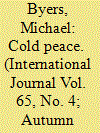

|
|
|
| 2 |
ID:
149556
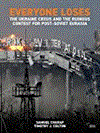

|
|
|
|
|
| Publication |
Oxon, Routledge, 2017.
|
| Description |
212p.pbk
|
| Series |
Adelphi Series no.; 460
|
| Standard Number |
9781138633087
|
|
|
|
|
|
|
|
|
|
|
|
Copies: C:1/I:0,R:0,Q:0
Circulation
| Accession# | Call# | Current Location | Status | Policy | Location |
| 058917 | 327.470477/CHA 058917 | Main | On Shelf | General | |
|
|
|
|
| 3 |
ID:
108206
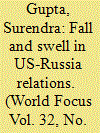

|
|
|
| 4 |
ID:
088816


|
|
|
| 5 |
ID:
174376
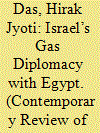

|
|
|
|
|
| Summary/Abstract |
Historically, Israel has been dependent on the imports of oil, coal, and natural gas to meet its energy demands, and energy security is an integral part of its security and foreign policy. In its neighborhood, gas relations with Egypt began in 2008, which was terminated in 2012, thereby propelling Israel to diversify its imports and explore domestic production. The latter inverted the energy balance that transformed Israel from being a buyer, and Egyptian firms have shown interest to open their market for Israeli gas. At the same time, fresh gas discoveries in Egypt have opened up new policy options and challenges for Israel. The research would be exploratory and contextualize the Israel–Egyptian relations through the prism of energy and focus on the potential for Israel’s gas diplomacy and engagement and would evaluate the drawbacks and challenges in its energy policy vis-à-vis Egypt.
|
|
|
|
|
|
|
|
|
|
|
|
|
|
|
|
| 6 |
ID:
129132
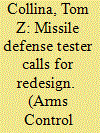

|
|
|
|
|
| Publication |
2014.
|
| Summary/Abstract |
The Defense Department's chief weapons tester called in January for the redesign of a key component of the U.S. system intended to intercept long-range missiles launched from North Korea or Iran, raising questions about the department's plans to expand the current system. J. Michael Gilmore, the Pentagon's director of operational test and evaluation, wrote in his annual report, released Jan. 29, that recent test failures of the U.S. ground-based interceptor (GBI) system raise concerns about the system's reliability and suggested that the missile's exoatmospheric kill vehicle (EKV) be redesigned to assure it is "robust against failure." Echoing Gilmore's view, Frank Kendall, undersecretary of defense for acquisition, technology and logistics, told a Feb. 25 conference in Washington, "We've got to get to more reliable [missile defense] systems." Merely "patching the things we've got is probably not going to be adequate. So we're going to have to go beyond that," he said. The EKV plays a central role in the missile defense mission. It is lifted into space by a booster rocket and then uses its onboard sensors to locate an incoming enemy warhead and destroy it on impact. U.S. officials have compared the task to hitting a bullet with another bullet.
|
|
|
|
|
|
|
|
|
|
|
|
|
|
|
|
| 7 |
ID:
112787
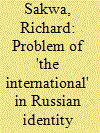

|
|
|
|
|
| Publication |
2012.
|
| Summary/Abstract |
A new era in international politics is gradually taking shape in which the legacy of the Cold War is gradually fading, but in which new lines of division are emerging. The major institutions of the Cold War period are undergoing a long decay although the political processes associated with them are becoming increasingly dysfunctional. New forms of multi-polarity are taking shape accompanied by the struggle between defenders of the status quo and those ready to adapt to the structural revisionism inherent in the new pattern of international politics. In all of this, Russia acts as the bellwether, developing as a distinct and separate pole in the international system rather than joining the Western constellation, as was anticipated after the end of the Cold War. Russia's great power identity in the international system is accompanied by domestic systemic specificities, which reinforce differentiation at the structural level. Russia's neo-revisionism does not repudiate the present balance in international order, but seeks to create what it considers to be a more comprehensive and equal system. This can be seen in its various forms of interaction and modes of engagement with 'the international'. In methodological terms, the attempt to analyse these changes through a Cold War lens is a categorical error that perpetuates anachronistic paradigms. By disaggregating Russia's engagement with the international into a number of distinct processes, we can delineate more clearly the interaction of structural and systemic factors that sustain Russia's neo-revisionism.
|
|
|
|
|
|
|
|
|
|
|
|
|
|
|
|
| 8 |
ID:
160777


|
|
|
|
|
| Summary/Abstract |
Donald Trump's election was a surprise to almost everyone all over the world. His presidency so far has been full of surprises and uncertainties as well. Although he has developed a good personal relationship with Chinese President Xi Jinping, Trump is still in search of a viable and coherent China policy. The U.S.-China policy and interactions between the U.S. and China are closely connected to the prospects of cross-Strait relations. The United States and China have different views on the current "cold peace" or stalemate across the Taiwan Strait, but they have shared an interest in avoiding conflict and maintaining peace and stability in cross-Strait relations. Neither President Trump nor President Xi wants to push the Taiwan issue to the top priority in U.S.-China bilateral relations. The Trump administration, unlike the Obama administration, has yet to articulate a clear regional strategy of hedging and balancing against China. It has no interest in pushing Taipei and Beijing to the negotiation table either. It is also unlikely that the two sides of the Taiwan Strait will come up with a new defining formula for the relationship, which is close to the "1992 Consensus," during the Tsai Ing-wen administration. If U.S.-China relations do not sour drastically under Donald Trump, cross-Strait relations will continue as a "cold peace" for the coming years.
|
|
|
|
|
|
|
|
|
|
|
|
|
|
|
|